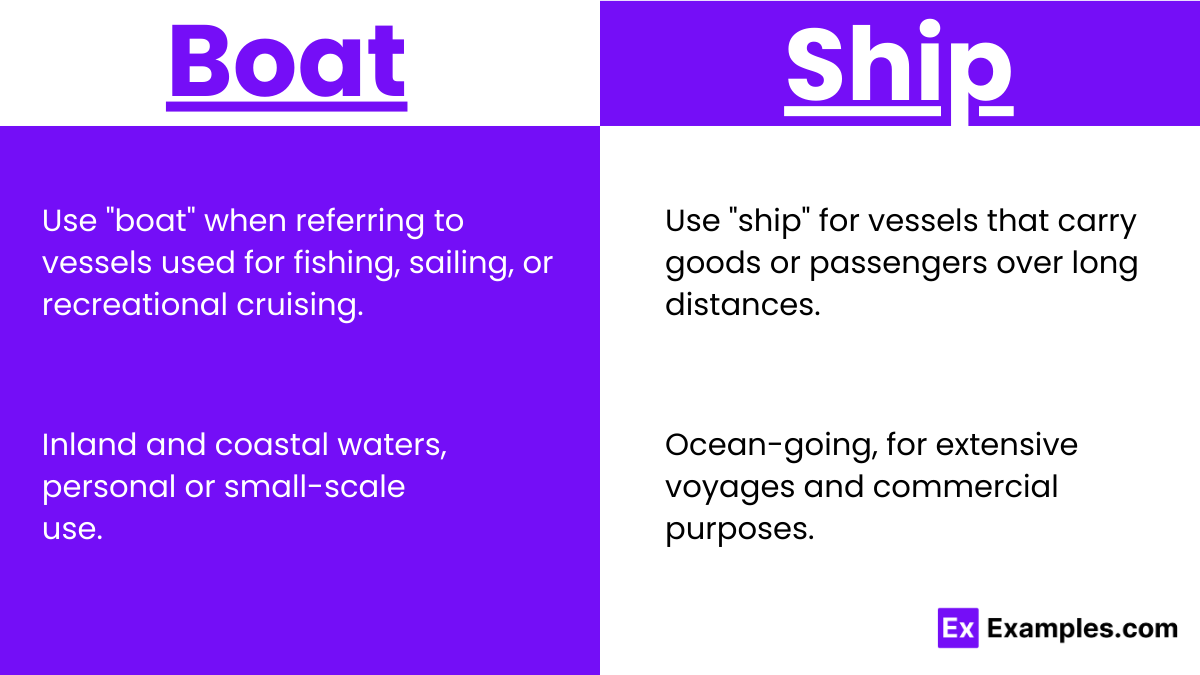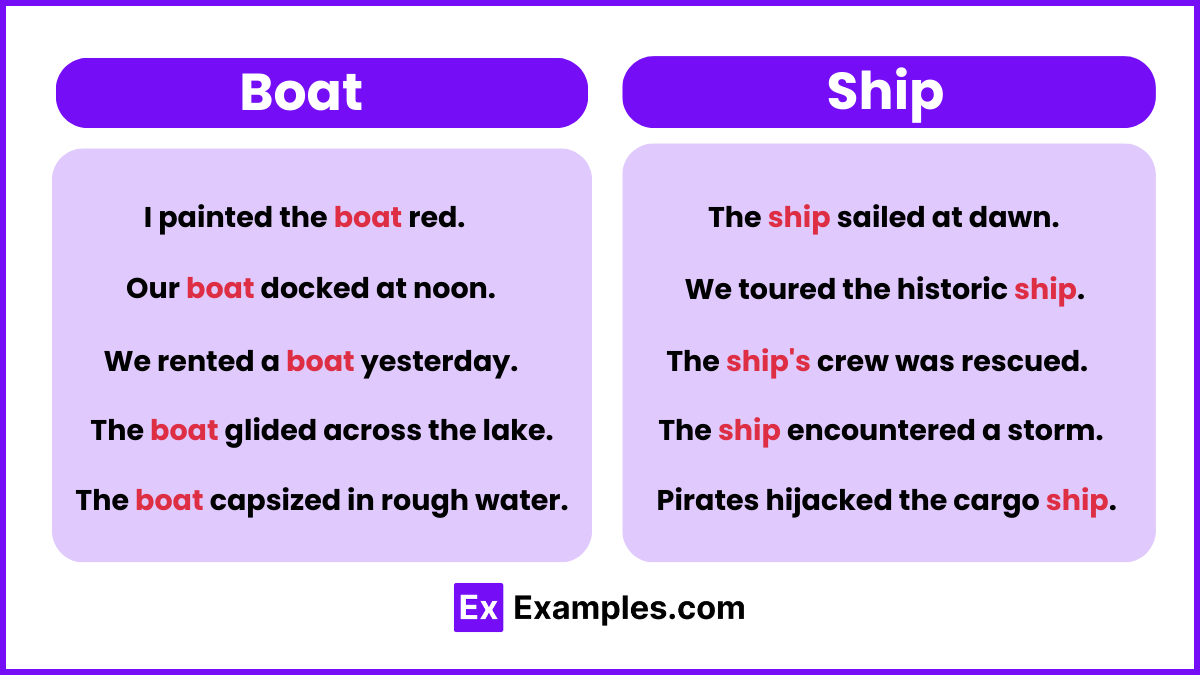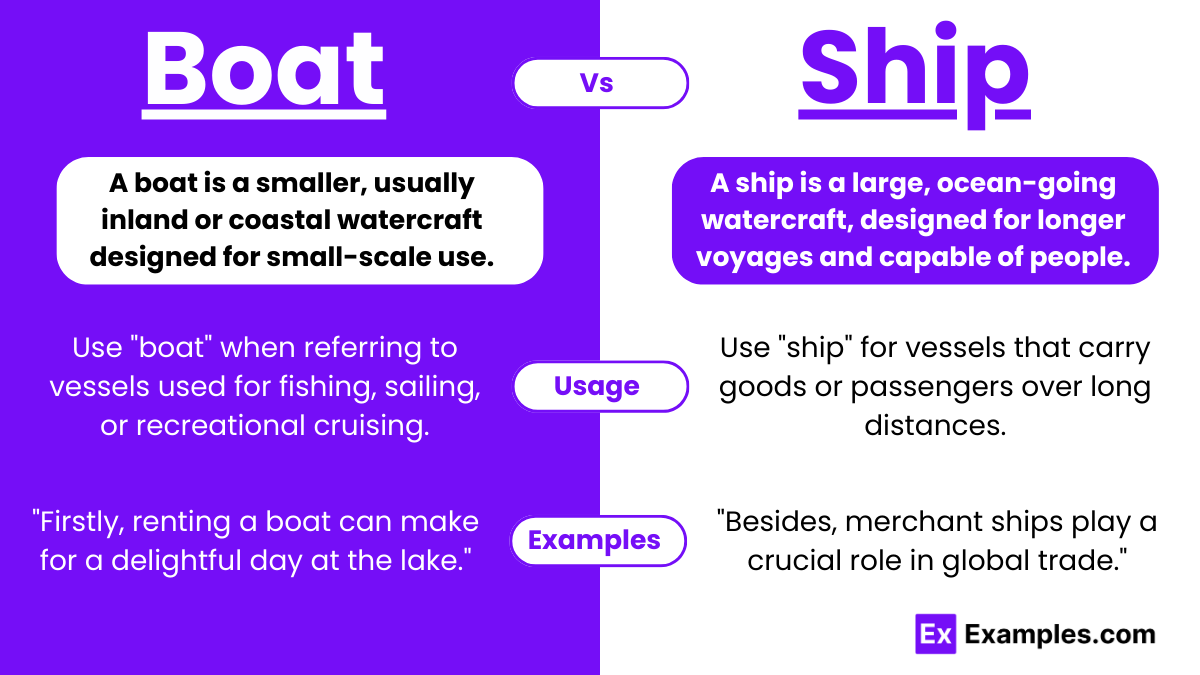Boat vs Ship – Meanings, Difference, Examples, Usage
Diving into the world of watercraft, we often hear about boats and ships, but what sets them apart? Simply put, boats are the smaller, often personal vessels you might use for a day on the lake or a short fishing trip. Ships, on the other hand, are the big players of the sea, designed for longer journeys, carrying lots of people or heavy cargo. So next time you’re by the water, remember: if it’s compact and cozy, it’s probably a boat, but if it’s massive and made for the long haul, it’s a ship.
Boat and Ship – Meanings
- Boat: A boat is a smaller, usually inland or coastal watercraft designed for personal or small-scale use. It can range from a simple rowboat to a motorized vessel, often used for fishing, leisure, or short-distance transportation.
- Ship: A ship is a large, ocean-going watercraft, typically designed for longer voyages and capable of carrying more people or cargo. Ships are engineered to withstand harsher conditions and deeper waters, often equipped with specialized facilities depending on their purpose, such as cargo holds, passenger accommodations, or weaponry for naval vessels.
Summary
In everyday talk, “boat” is a go-to word for all sorts of water-riding crafts, big or small, sail or motor-driven. Yet, the big ones that brave the ocean waves, sporting several sails or engines, are better known as “ships.” On the flip side, you wouldn’t usually call the smaller ones “ships.” For those grand, leisure-bound vessels not meant for trade but for fun sailing or cruising, “yacht” is the term we reach for.
How to Pronounce Boat and Ship
- Boat: Pronounced as /boʊt/ (BOHT).
- Ship: Pronounced as /ʃɪp/ (SHIP).
The pronunciation of these terms is straightforward, with “boat” having a long “o” sound, and “ship” featuring a short “i” sound.
Differences between Boat and Ship
| Aspect | Boat | Ship |
|---|---|---|
| Size | Smaller, can range from a dinghy to a yacht. | Larger, designed for deep waters and long voyages. |
| Capacity | Limited passenger and cargo capacity. | High passenger and cargo capacity. |
| Usage | Inland and coastal waters, personal or small-scale use. | Ocean-going, for extensive voyages and commercial purposes. |
| Construction | Simpler construction, often for specific, limited purposes. | Complex construction, equipped for a variety of purposes. |
| Stability | Less stable, more affected by rough conditions. | More stable, designed to withstand harsh sea conditions. |
How to Remember the Difference between Boat and Ship
A helpful mnemonic is that a ship can carry a boat, but a boat cannot carry a ship. Remember that ships are larger and equipped for long voyages, while boats are smaller and more suited for local or personal use.
When to Use Boat and Ship

Usage of Boat
- Leisure Activities: Use “boat” when referring to vessels used for fishing, sailing, or recreational cruising.
- Small-scale Transportation: “Boat” is appropriate for short-distance travel over water, such as ferrying across a river.
- Personal Use: Personal watercraft, kayaks, and canoes are all types of boats.
- Inland or Coastal Navigation: Boats are typically used in rivers, lakes, and coastal areas.
Usage of Ship
- Commercial Transport: Use “ship” for vessels that carry goods or passengers over long distances.
- Military Purposes: Naval vessels like destroyers and aircraft carriers are ships.
- Deep-sea Exploration: Ships are equipped for scientific research or exploration in deep oceanic waters.
- Large-scale Operations: Cruise ships and cargo ships are designed for significant passenger and cargo capacity.
Boat and Ship – Examples

Examples of Boat
- Firstly, renting a boat can make for a delightful day at the lake.
- Moreover, the fishing boat returned at sunset with a bountiful catch.
- On the other hand, rowing boats require manual power but offer a serene experience.
- Additionally, a speedboat is ideal for those seeking thrills on the water.
- Finally, maintaining a boat involves regular checks and upkeep.
Examples of Ship
- Firstly, the cruise ship offers a plethora of onboard activities and amenities.
- Besides, merchant ships play a crucial role in global trade.
- Conversely, a battleship is equipped for maritime warfare.
- Furthermore, research ships contribute to oceanic scientific discoveries.
- In conclusion, the sinking of historic ships often leads to intriguing underwater explorations.
Synonyms
| Term | Synonyms |
|---|---|
| Boat | Vessel, watercraft, dinghy, yacht, canoe. |
| Ship | Vessel, liner, tanker, freighter, carrier. |
Exercise
Fill in the blanks with either “boat” or “ship” to complete the sentences accurately.
- The __________ was prepared to embark on a three-month scientific expedition.
- We rented a small __________ for a leisurely paddle around the lake.
- Luxury __________ offer a wide range of amenities, from fine dining to onboard entertainment.
- His dream was to own a sailing __________ and explore the coastal waters.
- The cargo __________ docked at the harbor, ready to unload its goods.
Answers
- ship
- boat
- ships
- boat
- ship
FAQ’S
Does a Ship Count as a Boat?
Technically, a ship can be called a boat due to its waterborne nature, but its large size typically classifies it distinctly as a ship.
What is the Difference Between a Ship and a Boat in the Royal Navy?
In the Royal Navy, ships are larger, ocean-going vessels, while boats are smaller, often for specialized or support roles.
Is an Aircraft Carrier a Ship or a Boat?
An aircraft carrier, with its massive size and capabilities, is classified as a ship.
What Makes a Ship Not a Boat?
A ship’s large size, deep-water capabilities, and complex structure differentiate it from a smaller, simpler boat.
Why is a Submarine a Boat and Not a Ship?
Traditionally, submarines are called boats due to their smaller size and the way they’re carried by larger ships during transport.


